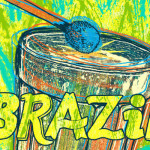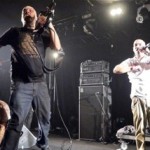Musa Okwonga is a writer, journalist, musician, actor and poet. Originally with a law degree from Oxford he gave it all up to persue the great love of his life – poetry
Always striving to perfect his art and push himself forward, he filmed a 360 video for his most recent poem ‘Heavyweight’
The original 360 version is can be seen here –
It is also here on You Tube –
I spoke to him about his work, his life and why London continues to inspire him
————————————————————————————————————————————————————————–
The 360 video is fantastic, who came up with the idea of filming it like that, and how do you go about something like that?
Richard Nockles of yellowBird Productions is the person to thank for that. He heard me perform this poem a few years ago, loved it, and got in touch. He filmed it by sitting on a buggy which had a many-faced camera mounted on a tripod, and as he drove it around town – through marketplaces, shops and narrow alleys – I walked alongside, performing the piece into the camera. It took a couple of days but was well worth it. We’re delighted with how it came out.
You have a very interesting back ground, you have a law degree from Oxford but yet you gave it all up to become a full time poet. That is a huge life change. Is it just something you HAD to do, has poetry always been part of your life?
Haha, it’s pretty wild now I look back at it, but giving it all up was just something I had to do. I have always written poetry – I’ve been doing that almost as long as I can remember writing, really. I actually studied law and then qualified as a solicitor in the City knowing that I would one day leave to be a writer: I knew that I’d be strapped for cash as an artist of any description, so I thought I would need a fall-back. Funny thing is, I’ve never considered returning to the law since I left it. The only thing I think I ever missed was the money, but thankfully I left the corporate world too soon to get used to it.
When I first saw ‘Heavyweight’ I very much saw it as a love letter to London. I love the comparison to Mohammed Ali. So…apart from the obvious, what inspired you to write it and make that comparison?
Hey, thanks very much; very glad you enjoyed it. I guess I’ve always seen London as an ageing prizefighter with just one swing left in it; a place that just keeps coming back and surprising you in new ways, just when you think its wit and charm might be on the wane. The moment that thought popped into my head, I thought that I’d put it into the ring with Ali and see what happened.
For me, London is the whole world in one city, and in its multi culturalism it is unique, what is it about the city that you find the most inspiring?
London has such a diverse population that it offers up unrivalled experiences. This city is just bottomless. Around every new corner there is a club or a bar or a shop or a music night, a park or a walk or a conversation that you couldn’t find anywhere else. There is a richness to it that is thrilling.
When you write a poem, does it come to you in fits and starts, or in one sweeping stream of consciousness?
Every poem emerges differently. I write some of them in a matter of hours, maybe minutes – those are the strange ones, they almost seem to write themselves. Other times, a poem will come to me in fragments – a line here, a line there – over the course of few months, and it’s only once I step back from them all and examine them carefully that they make sense. It’s odd. At such times, I feel less like a poet, and more like an archaeologist putting together a mosaic.
You have created poems covering a huge range of topics, family, love, sexuality and politics, are these all very personal paths for you, or are they sometimes taken from a third person perspective?
They’re all very personal, in that they represent my own take on a situation, even if they’re written from the third person. I always try to rationalise how I would behave in someone else’s shoes. Empathy is the most important thing in my writing, more so than technique. It’s only if I get that right that it will resonate with anyone.
You have also ventured into music and acting, and you are also a journalist [fingers in many pies!] are you working on any other particular projects at the moment?
Haha, I’m keeping relatively busy – you’re a long time dead, as they say, so I’ve got to do all that I can now. As for particular projects – I can’t reveal this one just yet, but it’s the most exciting thing I’ve worked on to date. I can say that it involves football, and radio, and that I’ll be presenting it. I can’t wait to share it.
Your family are originally from Uganda and looking at some of your work for The Kings Will, and your fantastic piece on Kony for The Independent, the country and culture reflects strongly in your work. How do feel about Uganda these days…where do you think the future lies?
How do I feel?…I feel like there is so much that is positive – the economy is doing well, the country is taking control of its own resources, there is a real sense of innovation in the financial and tech sectors. But that’s the macro picture. I do worry, socially, about the religious conservatism of the country, which seems to be sharply on the rise. But on the other hand, it will always be in my blood, and there are so many people achieving wonderful things. I hope one day to be able to help them get their messages out there, and would love to do more communications work there as time goes on.
There is a new wave of young poets coming up to the forefront [Dean Atta, Kate Tempest, Sabrina Mahfouz, Holly McNish, Deanna Rodger to name but a few] and ‘spoken word’ has found a new platform and identity. Why do you think people are responding so positively to poetry again?
Haha, as you know there are a dozen more names to add to that list, at the very least! Rosie Knight, Chimene Suleyman, Jodi Ann Bickley, Simon Mole, Warshan Shire, Bridget Minamore, Paul Cree, Kayo Chingonyi, Yemisi Blake, Raymond Antrobus, all outstanding. And so many more. Why the positive response? Because of the authenticity of the art form. You can commoditise poetry, but then it will no longer truly be poetry: because true poetry cannot be branded, it comes from the gut, and that’s what makes it beautiful, no matter how ugly the truths that emerge.
Advice to young poets….what would you tell them, where should they go for support and to get their work heard?
Go to the Poetry Cafe, 22 Betterton Street, at 6pm on Monday and sign up for the open mic. Take out your poem between your trembling hands or read it off the top of your head. Stay till the very end of the night. Talk to your fellow adventurers at the open mic night. Then go home, write, and practice some more. Check out the Roundhouse Poetry Slam, and if you’re under 25 then enter it. Doesn’t matter if you don’t win, just make sure you keep in touch with the judges. They’ll mentor you if you ask them nicely. If you don’t want to be a performance poet, and are more of a writer, then contact Live Magazine, they are fantastic for student writers. And never, ever stop writing. Best of luck. You’ll absolutely love it.

![Interview - Musa Okwonga [Heavyweight - A Love Letter To London] 27 Interview - Musa Okwonga [Heavyweight - A Love Letter To London]](https://www.godisinthetvzine.co.uk/wp-content/uploads/2013/05/4941952771_a018117c81_z.jpg)


